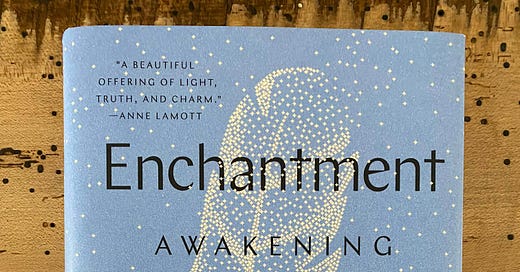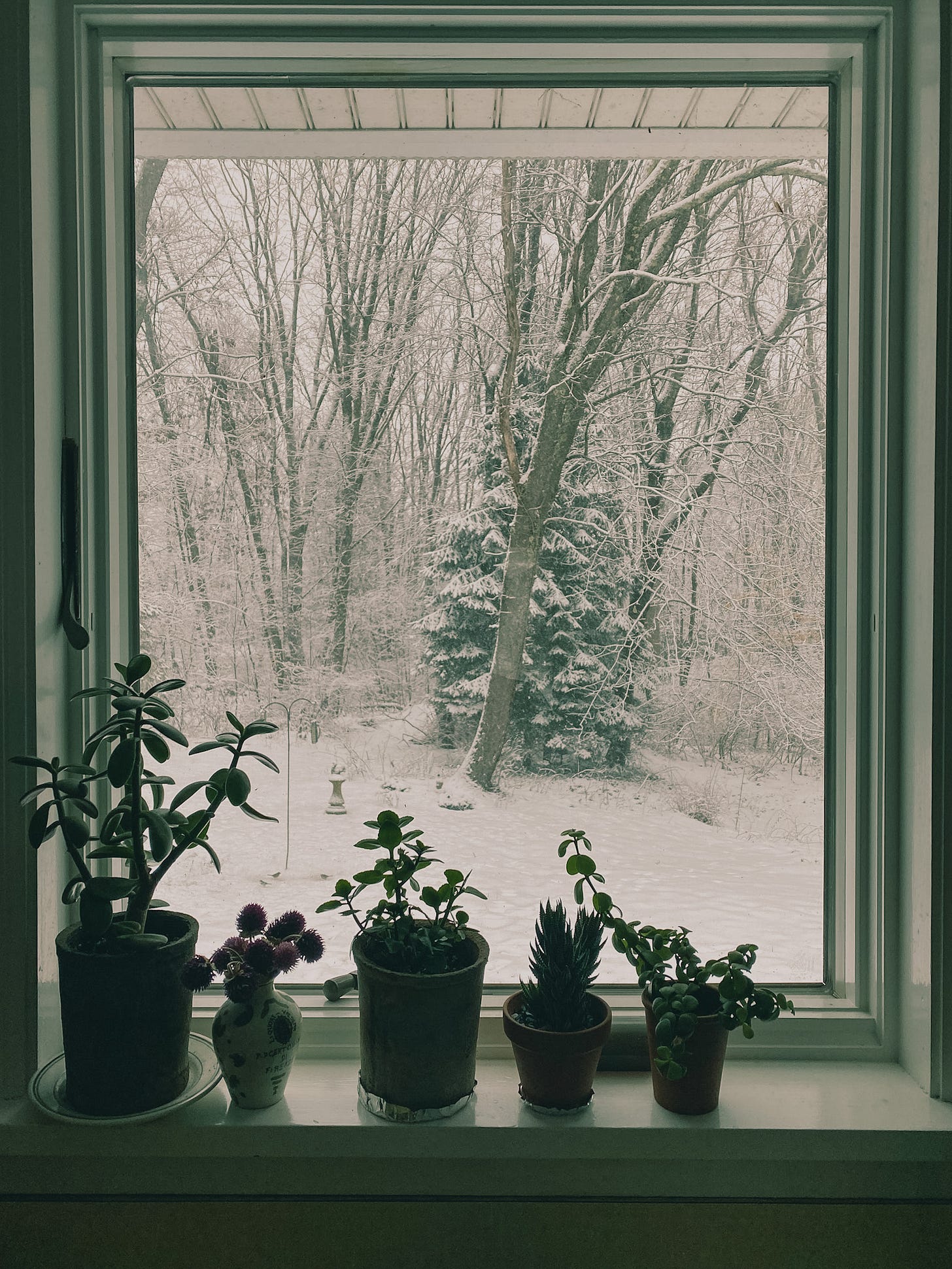It started to snow late yesterday afternoon: first, fine delicate flakes, and then, a steady powder, and then, it began to pile up everywhere — on our deck, on the garden fence and gate, on the Adirondack chairs. It hasn’t snowed much this winter, and so I was happy to finally have it, not because of my preternatural connection to it — my grandmother also adored snow, and it was no surprise to me that when she died during a freak April storm in 1982, massive flakes fell as I got the news from my stepfather, calling me at college in Boston —- but because it blanketed everything. Yesterday, it muffled the noise of anxiety and the loss of an entire day’s work putting out an eldercare financial fire from a distance without physically exposing myself to its source. By late afternoon, I was depleted, and all I could do was sit on the couch and read.
But the snow fell and fell, and everything became beautiful and soft; the toxic became neutralized and then subdued, and when I woke this morning, pulled on my boots and stepped outside, it was like standing in a shaken snow globe. I tilted my head back and let the flakes land on my face and soak my collar, and then I came back inside, turned off the volume on the landline (I still have a landline), and sat down to work. And it may seem minor or even frivolous, but this experience in the throes of such human tumult — the snow, the flakes, the beauty, the noticing of it all — is awe at work. This is the noticing; this is wonder. In a time of such fear and disquiet, it is enchantment.
I write this from a place and time of enormous personal change and challenge. The way I live my life is having to shift because fifty-nine years of cortisol overload has done immense physical damage to my body which, when I contracted Covid in 2020, came to a head. I’m spending a lot of time every day trying to relearn the most basic laws of balance and equilibrium, of homeostasis, as they apply to me personally, but also universally. I’m thinking and writing a lot about the proverbial treadmill — the game of existential Whack-A-Mole where we are tugged at and yanked from one extreme to the other, where boundaries are considered merely a suggestion meant to be tested, when friendships swing on a rusty hinge of emotional demand and binary requirement lacking nuance, when we spend so much time looking at the Screens of Comparison and Competition — that I’ve finally come to terms with the fact that most of us have inadvertently sliced away the visceral and intuitive part of our lives meant for wonder. Any person — any society — that exists devoid of awe and enchantment is in grave danger of gripping the edges of the existential pool so tightly that its nail beds bleed; it will be disconnected from that which makes it human. A civilization disconnected from the profound, writes the author Katherine May in her gorgeous new book, Enchantment, leads to meaning having seeped away, leaving us with nothing more than the demands of an industrial society in the place of profundity.
The opposite of awe and enchantment is cynicism born of the arrogance of certainty.
I first encountered Katherine on Krista Tippett’s On Being, where they were in conversation about Katherine’s (then) new book, Wintering. Krista was recording the conversation from her apparently freezing Minnesota basement — everyone was still in lockdown — and Katherine was at home in her work space in Whitstable, England. It was a truly wonderful, life-giving conversation, and at one point, Katherine’s cat started meowing to be let out. And I remember thinking distinctly how remarkable this was; how beautiful, in part because Krista’s conversations are so very well produced that it’s something the listener never really hears. It is, on the face of it, such a mundane, minor thing: one person sitting in her basement leading a conversation with another person an ocean away who has to get up to let the cat out. We hear the creaking of the door, the meow, the sitting back down in the chair, the continuing on of the conversation. I replayed it again and again just to hear that moment because, as I teach my memoir students: there is magic in the mundane. That is where it is born, and where it lives.
Any person — any society — that exists devoid of awe and enchantment is in grave danger of gripping the edges of the existential pool so tightly that its nail beds bleed; it will be disconnected from that which makes it human.
Katherine and I became friends after we had our own conversation on her podcast, and then, months later, led a day-long August workshop together in Maine, during which Katherine sent our workshoppers out to walk, notice, write, and return to the barn we were working in with what they found, assuming their findings were movable. The practice was not one of collecting, but of noticing and looking. What came back with them: seaweed strands of various kinds, sea beans, small shells, stones, a leaf just beginning to turn red. At the end of the workshop, Katherine and a few of our workshoppers walked into Rockport Harbor and swam in the very cold water, at dusk. I did not join them; my resistance to corporeal discomfort runs deep and fast, from a place where my body has learned to do anything it can to protect itself from perceived danger, even if that danger will ultimately lead to revelation. I don’t jump into cold bodies of water; I don’t do plunges. I don’t climb mountains or ski treacherous slopes. I avoid conflicts of all kinds, at all costs. So I watched Katherine and the workshoppers; they walked into the water and bobbed around like buoys, dunking their heads in, looks of meditative, otherworldly bliss on their faces. I longed to be one of them, to — just for a moment — drop my armor and feel the cold, dangerous Atlantic carry and support my body; I wanted to float on my back and see the stars just beginning to appear, and the moon rising. I wanted to enter this ineffable space of enchantment, and I wept quiet tears that no one saw — not even my wife — for an unfulfilled yearning that I couldn’t put my finger on.
That night, my friend, the writer Kathleen Hackett, hosted us for dinner at the Rockport Boat Club. While we ate, Katherine’s young son, Bertie, made friends with some men fishing off the sea wall, catching tiny squid. Utterly delighted, he came racing back to us, his hands stained pitch black with cephalod ink.
Look — he said, his eyes wide. Look at this! Just look —-
Bertie was stunned, thrilled, completely engaged in the finding and experiencing of the magical, that space between the terrains we live among every day, but rarely notice. In Katherine’s beautiful new book, Enchantment, she describes it this way:
Enchantment is small wonder magnified through meaning, fascination, caught in the web of fable and memory. It relies on small doses of awe, almost homeopathic: those quiet traces of fascination that are found only when you look for them. It is the sense that we are joined together in one continuous thread of existence with the elements constituting this earth, and that there is a potency trapped in this interconnection, a tingle on the border of our perception. It is the forgotten seam in our geology, the elusive particle that binds our unstable matter: the ability to sense magic in the everyday, to channel it through our minds and bodies, to be sustained by it.
In the world in which we exist — monetized, industrialized, competitive, isolating, anxious, artificial, constitutionally grief-stricken and exhausted — is it possible to feel the magic in the everyday, to trust that it will carry, support, and nurture us? The opposite of awe and enchantment is cynicism born of the arrogance of certainty — certainties harden us, writes Katherine in Enchantment — the most fundamentally dangerous threat to our own sustenance and survival as the interconnected beings that we are. Marcus Aurelius had it right: Dwell on the beauty of life, he wrote. Watch the stars, and see yourself running with them.
I will try; heaven knows, I will try.







Several nights ago, walking home from the grocery store and with nothing in my head beyond dinner, I looked up and saw a curved, golden sliver in the sky, close to the horizon. It was the waning crescent moon. Straight over the golden sliver shone two planets. I knew that they were planets, not stars, because they didn't twinkle. Their lights were steady. I put my bags down on a (fairly clean) rock and asked Google what was in the night sky over Tel Aviv; the two planets were Mercury and Jupiter. Isn't it strange how knowing something's name makes you feel like you possess it? So I stood on the sidewalk, wondering if by-passers would think I was just a crazy old lady, or if anyone would look up and witness the beauty too, and be awed and thankful like me. Then I stopped caring. Because the beauty of this extra-terrestrial vision was mine alone to feel. I still hold it in my mind's eye. But yes, mine alone. Even if my face lifted to the night sky intrigued someone else to look up. I think that we sustain and nurture ourselves when we witness what moves our spirits, and allow it to fill us. It's our capacity, or desire, to be open to it. The magic is always there. It's up to each one to see it.
Oohhhh this is so beautiful and I’m so honoured! Thank you, you magical person 🤍🤍🤍